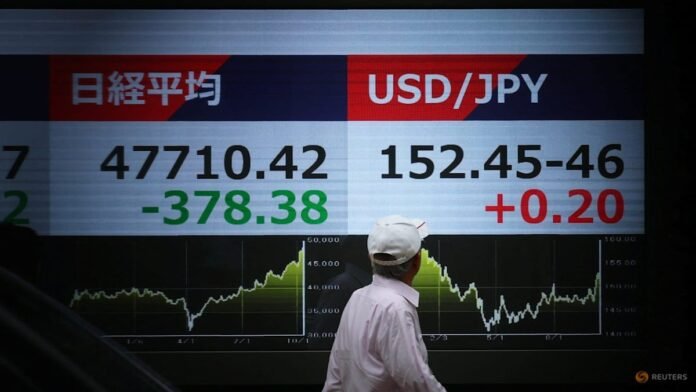Asian investors were relieved after early gains in Seoul and Hong Kong helped trim losses that had begun to bite the region’s bourses. While Washington’s latest tariff announcement still reverberates, markets in Tokyo and Singapore narrowed their fall‑off, showing a subtle shift from headline‑driven fear to a more balanced outlook.\n\nAsian stocks tighten tariff‑driven losses\n\nThe biggest take‑away from today’s trading was the slowdown in downward momentum across the continent. In Shanghai, the benchmark SSE Composite eased from a 0.8 % slump to a 0.2 % dip, easing worries that rising U.S. tariffs on Chinese goods might cripple export‑heavy firms. Meanwhile, the Tokyo Stock Exchange’s Nikkei 225 closed 260 points lower, a sharper fall than last week’s 400‑point slide, signalling that investors were starting to look beyond the trade headlines.\n\nAnalysts point out that the tariff story, while still on the radar, is no longer the only driver of volatility. “The tariffs are a backdrop, but domestic issues in Japan are now pulling the focus,” said Hiroshi Tanaka, a market strategist at Nomura in Tokyo. “If the political scene calms, we expect a broader rebound.”\n\nTokyo rattled by political turmoil\n\nIn Japan, the Milestone dropped 0.6 % after lawmakers in the House of Councillors questioned the ministry’s handling of the ongoing security review. A coalition support‑gap threat surfaced after the ruling party’s top executive pledged “fair negotiation” on gun‑control bills, stirring concern that legislative gridlock could delay crucial defense spending. The finance ministry’s new austerity plan was also under scrutiny, with critics arguing it would erode corporate investment.\n\nThe turbulence followed a sharp sign‑off in the city‑wide vote on Thursday, where the opposition hit the opposition in the city mayor’s race, a signal of growing discontent that may see higher interest‑rate speculation climb.\n\nImpact on investor sentiment\n\nGlobal investors traded cautiously today, balancing a bullish view on US tech earnings against the uncertainty in Japan’s political arena. The market’s reaction to the tariff update was muted, indicating that the trade war’s most painful phase may be over. Instead, short‑term forces such as policy shifts in Japan and local corporate earnings are now dominating investor sentiment.\n\nAmid these developments, a handful of companies led the rally in regional markets. In Seoul, the auto giant Hyundai Motor rose 1.4 % after a boost from stronger foreign‑exchange gains. Japanese manufacturers, such as Toyota and Honda, gained modestly after spelled out plans for future model launches.\n\nLooking ahead\n\nAnalysts expect Asian bourses to remain vulnerable to any sudden policy changes from Washington or Tokyo. The most likely triggers involve a sudden increase in import tariffs or a new political crisis in Japan that could push interest rates higher. Conversely, positive corporate earnings and sustained oil price support could cool fears and help stock prices climb.\n\nFor investors, staying alert to domestic policy announcements and global economic data will be key. Those who have been hiking positions on Japanese and Korean equities may need to tighten their risk profile if the political scene in Tokyo shows continued weakness.\n\nIn sum, Asian stocks have trimmed their tariff‑driven losses today, yet Tokyo’s political turbulence keeps capital on edge. The market will be watching how policy and earnings play out over the coming weeks to see if a stronger rebound is on the horizon.
Stay informed on all the latest news, real-time breaking news updates, and follow all the important headlines in world News on Latest NewsX. Follow us on social media Facebook, Twitter(X), Gettr and subscribe our Youtube Channel.



